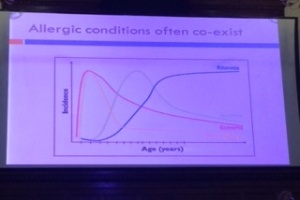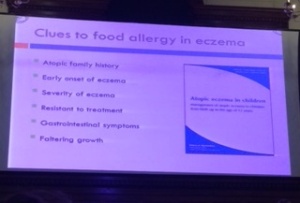 This weekend saw the Allergy UK annual conference take place. It was a chance for parents, carers and sufferers of allergies to come together, meet professionals in the allergy arena, and seek invaluable support and advice.
This weekend saw the Allergy UK annual conference take place. It was a chance for parents, carers and sufferers of allergies to come together, meet professionals in the allergy arena, and seek invaluable support and advice.
It didn’t disappoint!!
The day started with an introduction from Professor Peter Howarth, who explained the background of Allergy UK, and their dedication to supporting the 20 million people in the UK alone who suffer with at least one allergy.
He explained that allergies/ allergic reactions are now being reported to affect almost all areas of the body, and traditionally, more than one site of the body often reacting. Allergy UK are working hard to try to promote ongoing improved understanding.
The message given to the audience was that all feedback is welcomed so that Allergy UK can continue to improve the allergy situation in the UK, and tailor it according to need.
Lindsey McManus then took over, and provided details on the current and future projects that Allergy UK are working on.
It was wonderful to hear of the important work, often behind the scenes, that Allergy UK are doing with their partners, and the anticipation felt by the attendees was palpable.
Next year sees Allergy UK’s 25th anniversary, definitely something to be celebrated!!
A fantastic presentation on ‘The Allergic March’ then followed with Dr Helen Brough, who totally captured the audience with her insight into the increase of allergic conditions, and the growing understanding of the relationship between eczema, food allergy and asthma.
It is understood that allergies affect more than 5% of children in the UK, and the rate of eczema is rising in line with this.
In addition, asthma is now one of the most common long term conditions.
Through increased understanding, it is known that food allergy exacerbates eczema, and eczema can cause food allergy. On top of this, food allergy, especially multiple food allergies is associated with an increased risk of asthma. And the more food allergies, the more likely the child will have asthma.
Dr Helen Brough then went on to explain about peanut allergy – which all attendees found extremely interesting following the recent fascinating LEAP study results that were released earlier on this year.
If children are exposed to high peanut dust content in the air at home, it is now known to have a high chance of a peanut allergy being present beyond 6-12 months of age. If a child has eczema as well, there is a much higher risk of a confirmed peanut allergy.
33-81% of children with moderate to severe eczema have immediate food allergies. It is understood that children with eczema may become allergic to food through the skin, and confirms the importance of maintaining good skin care and controlling the eczema successfully for these children.
 An important point to note, especially for the NHS, is that of the cohort of susceptible children used in a recent study, allergic rhinitis increases asthma severity risk, to the point where there is a potential 3-fold risk of frequent wheezing attacks, and a 10 fold risk of frequent GP visits.
An important point to note, especially for the NHS, is that of the cohort of susceptible children used in a recent study, allergic rhinitis increases asthma severity risk, to the point where there is a potential 3-fold risk of frequent wheezing attacks, and a 10 fold risk of frequent GP visits.
Crucially, if correct treatment of rhinitis is provided, there is a lower risk of asthma related A&E attendances, and therefore less hospitalisation. In the details provided by Dr Helen Brough, 47% of patients did not have an asthma related event, which reduced hospitalisation by 61%!!
This completely reinforces my ongoing beliefs that HCP’s require more training and better understanding of the true implications that eczema, asthma and most importantly allergies bring. As well as looking at the full picture and gaining a true medical history to build an accurate picture of the patient in front of them.
It was a truly fascinating start to what turned out to be a highly informative day!




